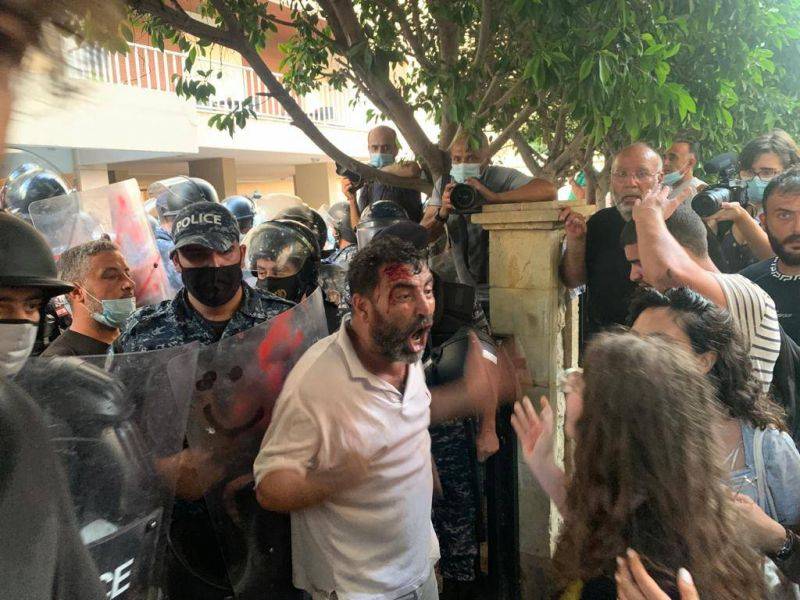
A bloody protester outside the home of caretaker Interior Minister Mohamed Fehmi in Beirut on July 13, 2021. (Credit: Mohammad Yassine/OLJ)
BEIRUT — Families of the victims of the devastating Beirut port blast have vowed to step up their campaign to see justice served following this week’s anniversary of the disaster — including potentially storming Parliament and even politicians’ houses.
“Unless these politicians decide to put guards on their houses 24/7, they can’t prevent this from happening,” said Ibrahim Hoteit, the spokesperson for a group of victims’ families.
On Monday, ahead of the one-year anniversary of the port explosion that killed 218 people, Hoteit had called on authorities to lift immunity from top officials implicated in the blast within 30 hours, saying that otherwise, “we are done with peaceful protests ... and we are moving toward more confrontational movements.”
To date, Parliament has not taken action to lift immunity from three sitting MPs named by the lead investigator in the probe of the port blast as being potentially culpable, nor has a session been set to discuss the matter.
Under Article 40 of the constitution, sitting MPs generally may not be prosecuted for a crime unless the Parliament acts to overturn their immunity, or unless they are caught in the act.
Judge Tarek Bitar, who is heading up the investigation, last month requested that Parliament lift immunity from MP and former Finance Minister Ali Hassan Khalil, MP and former Public Works Minister Ghazi Zeaiter and MP and former Interior Minister Nohad Machnouk.
Many of their colleagues in Parliament reacted by signing a petition to launch procedures in which Parliament — not Bitar — would interrogate the officials.
The 26 MPs who signed the petition included members of the Amal Movement, Future Movement and Hezbollah.
Since then, some officials have changed their public stance and said they support the lifting of immunity for MPs, including the head of the Future Movement, Saad Hariri, and the head of Amal Movement, Nabih Berri.
But Hoteit said unless officials follow up by voting to lift immunity, the promises are “just words.” Until there is concrete action, he said, the families plan to escalate their protest tactics.
Their usual vigils on the fourth day of every month will continue, Hoteit said, but will be supplemented by more aggressive tactics.
“The lighting of the candles, the standing before Parliament are all meaningful things, but they are not intimidating politicians and hence why we will be more confrontational,” he said.
Instead of standing in front of the Parliament building and in front of politicians’ houses, they will attempt to break into them, he said.
On July 13, protesters from the victims’ families clashed with security forces in front of the home of caretaker Interior Minister Mohamed Fehmi after the minister rejected Bitar’s request to prosecute General Security chief Abbas Ibrahim. During that protest, some demonstrators got as far as the entrance of the house and smashed a glass facade before being pushed back by security forces.
Hoteit said that protesters had not intended to break into the house that day but that “the security forces attacked a mother of one of the victims so … protesters reacted aggressively.”
On Aug. 4, thousands of people took to the streets of Beirut to mourn the tragedy and pressure the political class to lift immunity. Some of the protesters tried to storm the barricaded entrance to the empty Parliament building but were pushed back by tear gas and water cannons fired by security forces.
While their attempts to breach the building were unsuccessful, Hoteit said the victims’ families were heartened to see the numbers in the streets.
“It means that there is an army behind us, and that even if we decide to break into Parliament, we can actually achieve it,” he said.